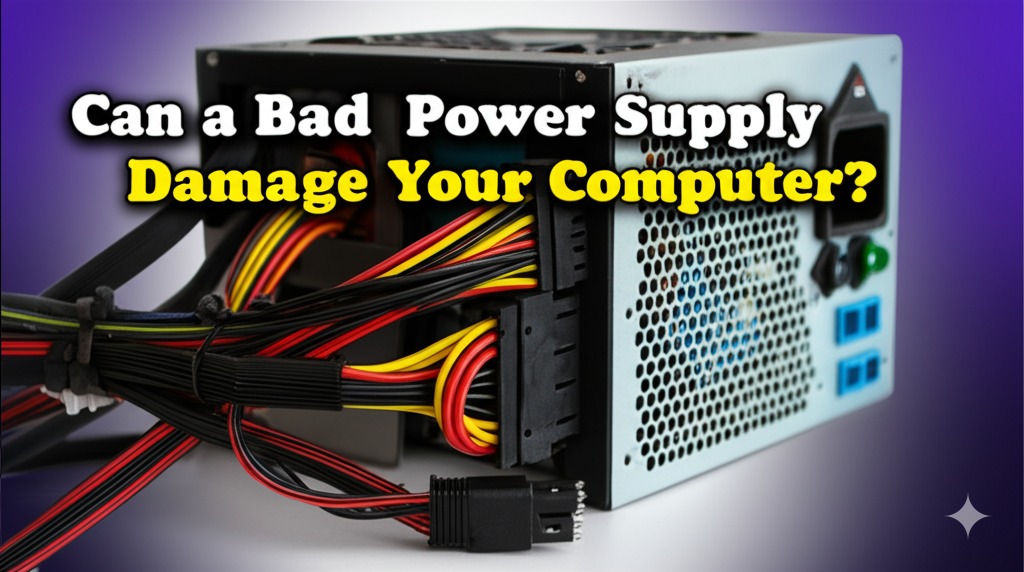Introduction: When your computer suddenly crashes or starts acting up, one of the last things you might think of is the power supply. However, a bad power supply can wreak havoc on your computer, leading to performance issues, hardware damage, and even total failure. In this article, we’ll explore how a faulty power supply can affect your computer, the signs to watch out for, and what you can do to protect your system from this critical issue.
What is a Power Supply and How Does It Work?
A power supply unit (PSU) is one of the most crucial components of your computer. Its primary role is to convert electrical power from your wall outlet into the correct voltage required by your system’s components. A good power supply ensures your computer’s stability and smooth operation. Without a reliable PSU, all the intricate parts inside your computer might not function properly.
- Converts AC to DC: The PSU converts alternating current (AC) from your wall into direct current (DC) for the computer’s internal components.
- Distributes power: It evenly distributes power to components like the motherboard, hard drive, GPU, and RAM.
Can a Bad Power Supply Damage Your Computer?
Yes, a bad power supply can definitely damage your computer. The severity of the damage depends on the nature of the PSU problem. Here are a few ways a faulty power supply can harm your system:
1. Voltage Spikes and Power Surges
A bad power supply can cause voltage fluctuations, leading to spikes or power surges that might reach your sensitive components. This is a serious risk because too much voltage can:
- Burn out components like the motherboard, CPU, and hard drives.
- Cause data loss, especially if the surge affects storage drives.
2. Insufficient Power
Sometimes, a PSU might fail to provide enough power for all the components in your system. When this happens:
- Your computer may experience random shutdowns or freezes.
- Overloading your PSU can result in system instability and decreased performance.
3. Overheating
A faulty power supply can also cause overheating issues. An underperforming PSU might not efficiently manage heat dissipation, leading to:
- Excessive heat build-up, which can damage sensitive components.
- Reduced lifespan of the PSU and other components like the GPU and CPU.
4. Complete Power Failure
In the worst-case scenario, a bad power supply can cause a total power failure:
- Your computer won’t turn on at all, or it will suddenly shut down without warning.
- In some cases, a short circuit caused by a defective PSU could even result in permanent damage.
Signs Your Power Supply May Be Failing
It’s not always obvious when your power supply is starting to fail. Here are common signs to look out for:
1. Frequent System Crashes or Freezes
If your computer is constantly crashing or freezing, especially during high-load tasks (gaming, video editing, etc.), it might be the result of an underperforming PSU.
2. Random Shutdowns
Randomly turning off without warning is another clear indicator. If this happens frequently, it could be the PSU not supplying enough consistent power.
3. Strange Noises or Burning Smell
A malfunctioning PSU may emit unusual sounds, such as buzzing or whining. A burning smell can also be a sign that the PSU is overheating or short-circuiting.
4. Power Issues When Starting Up
Difficulty powering on or intermittent power starts can point directly to a power supply issue. If your computer hesitates to start or requires multiple attempts to power on, the PSU may be failing.
How to Protect Your Computer From a Bad Power Supply
There are several steps you can take to protect your computer from the damaging effects of a bad power supply:
1. Use a High-Quality Power Supply
Investing in a reliable, high-quality PSU is one of the best things you can do for your system. Look for one that is:
- 80 Plus Certified: This certification ensures your PSU is efficient and stable.
- Appropriately rated for your system’s power needs: A PSU with too little wattage can cause instability, while an oversized one can be wasteful.
2. Use a Surge Protector
A surge protector or uninterruptible power supply (UPS) can prevent damage from electrical surges or voltage spikes, adding an extra layer of protection to your computer.
3. Regularly Monitor Power Supply Health
Many tools allow you to monitor your PSU’s performance. Programs like HWMonitor or Open Hardware Monitor can keep track of voltage levels and system temperatures, alerting you to potential problems early.
4. Replace the Power Supply When Necessary
If you start noticing any of the signs of failure mentioned earlier, it might be time to replace your PSU. It’s always better to be safe and avoid the risk of damaging your valuable hardware.
Conclusion
A bad power supply can indeed damage your computer in multiple ways, from causing random shutdowns to burning out essential components. Protecting your system starts with investing in a high-quality PSU, using surge protection, and monitoring the health of your power supply. If you notice any warning signs of a failing power supply, it’s crucial to act fast and replace it to avoid costly repairs.
Don’t wait until it’s too late—take the necessary precautions to ensure your computer stays safe and reliable. For more tech tips and guides, be sure to check back regularly and stay informed about how to optimize your PC’s performance.

Caleb Carlson is a contributing writer at Computer Site Engineering, specializing in computer technology, software trends, and hardware innovations. His articles simplify complex tech topics, making them accessible to readers of all levels.





